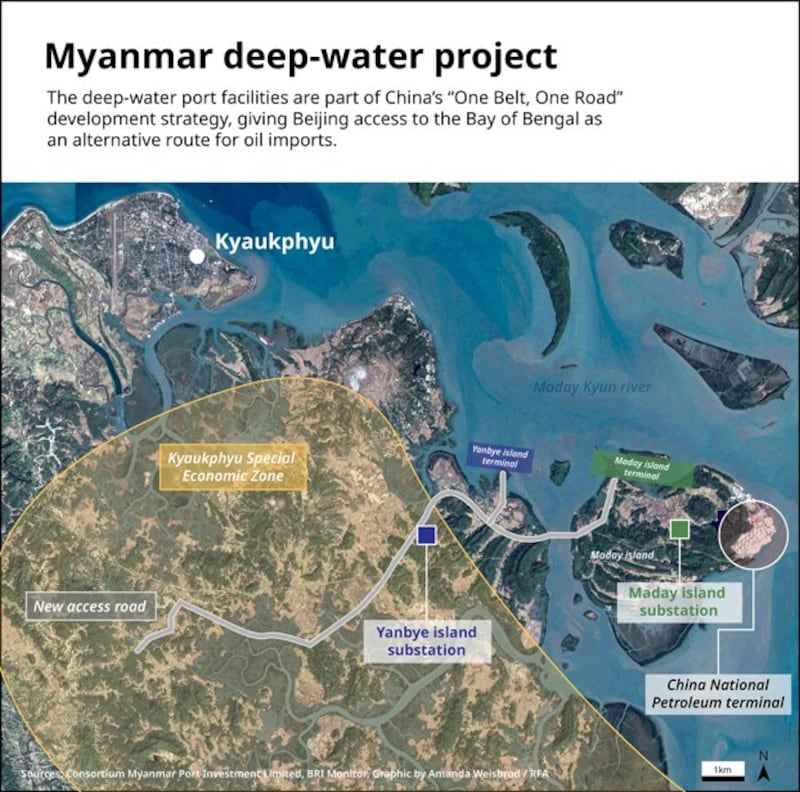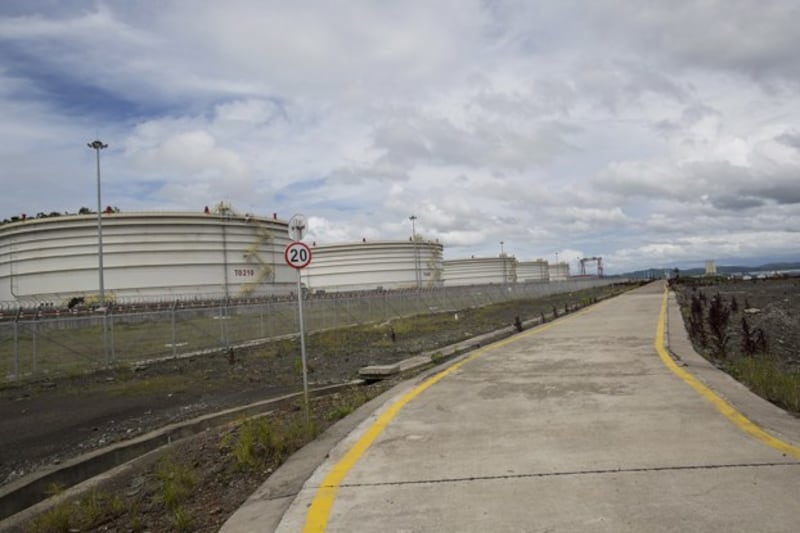Intense fighting between junta troops and an ethnic army in western Myanmar’s Rakhine state has threatened to disrupt Chinese-backed infrastructure projects that are part of the Belt and Road Initiative.
Progress has stalled on the projects — the Kyaukphyu Special Economic Zone, a deep-sea port and a railway — because of the armed conflict, said a Rakhine resident who has been monitoring developments there.
“For the time being, China’s two important projects — the railway and deep-sea port — are impossible to implement, because the [railway] must connect Kyaukphyu to Mandalay,” he said. “Currently, there is fighting in both Mandalay and Magway regions. There are also conflicts in Rakhine state, so it is challenging to implement the project.”
The Kyaukphyu area is also the starting point of dual pipelines that transport oil and gas across Myanmar and into China. The pipelines are Myanmar’s largest energy infrastructure project and a crucial source of revenue for the Southeast Asian country.
Intense clashes between the junta and the Arakan Army, an ethnic armed organization also known as the AA, resumed in Rakhine state on Nov. 13. The AA is now dominant in southern parts of the state, though battles continue, said a second resident who declined to be named for safety reasons.

Nevertheless, Myanmar and China are trying to speed up the implementation of the deep-sea port project — a key part of China’s Belt and Road initiative in Myanmar — said Aung Naing Oo, chairman of Myanmar Special Economic Zone Central Working Committee and the junta’s Union Minister for Union Government Office 1.
To that end, a Burmese and a Chinese official involved in the port project signed an addendum to the original agreement in Naypyitaw on Tuesday, as armed conflict in the state expands, according to the junta’s cabinet minister via the state media.
The project will improve living standards and create job opportunities in Rakhine state, including in Kyaukphyu, Aung Naing Oo said.
Threat to fishing
But Kyaukphyu residents, who are economically dependent on fishing, said they have little faith in the project, fearing they will lose their livelihoods.
They pointed out that authorities cited similar incentives for locals when building the natural gas and oil pipeline project, though they failed to materialize, residents, who did not want to be named for safety reasons, told RFA.
“One or two projects have been implemented, but the locals didn’t get job opportunities,” one local said.
China is investing the bulk of the money in the deep-sea port project, which will have 10 jetties where container ships can dock and accommodate about 7 million 20-foot containers per year, with goods shipped to Europe, South Asia and Africa.
Because the AA dominates sizable areas in Kyaukphyu and Ramree townships, where the project will be implemented, China will have to negotiate with the AA, a third resident pointed out.
The Chinese Embassy in Yangon did not respond to an email request for comment.
Myanmar’s previous civilian-led government signed the agreement to build the deep-sea port and special economic zone in November 2020.
Residents flee
A skirmish between the AA and junta forces in Ramree township on Dec. 18 drove nearly all of town’s 10,000-plus residents from their homes after the Myanmar military unleashed attacks by its army, navy and air forces, residents told Radio Free Asia. The island is the site of one of two deep-water container ports financed by a Chinese consortium.

An elderly man from Laung Chaung village was killed and two girls from Nyaung Pin Hla village were seriously injured when the junta’s forces fired heavy weapons during the fighting, according to a statement issued the same day by the Three Brotherhood Alliance of ethnic armed organizations, including the AA.
Additionally, four junta soldiers were killed, the AA seized arms and military equipment, the statement said, though RFA could not independently confirm the information.
The following day, the junta deployed warships around Ramree Island and fired heavy weapons, a resident told RFA. Internet and phone lines were cut off, making it difficult to obtain further information on the situation.
The ongoing fighting in Rakhine state could expand to Kyaukphyu, Toungup, Thandwe and Gwa townships, said the first resident.
In a statement issued on Dec. 10, the AA said it seized four police stations and a police battalion in Ramree township.
Fierce fights between the junta troops and the AA forces also occurred in Rakhine’s northern townships, including in Pauktaw on Dec. 18, when a junta battalion opened fire on the town with heavy weapons, according to the AA.
The ethnic army said it seized 142 army camps in Rakhine state and Paletwa township in Chin state during the fighting.
RFA could not reach junta spokesman Maj. Gen. Zaw Min Tun or Hla Thein, junta spokesman and attorney general for Rakhine state, for comment.
More than 100,000 civilians have fled their homes in Pauktaw, Ponnagyun and Minbya townships due to the fighting, according to the United Nations Office for the Coordination of Humanitarian Assistance.
Translated by Htin Aung Kyaw for RFA Burmese. Edited by Roseanne Gerin and Malcolm Foster.
